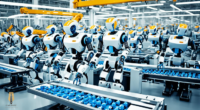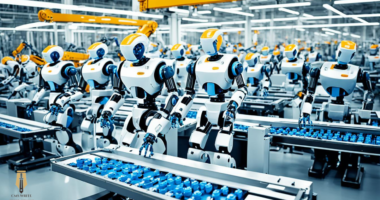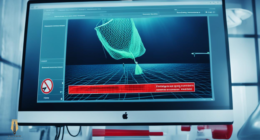AI’s Impact on Healthcare: A Revolution Unfolds
Did you know the global AI in medical imaging market is set to hit $14,423.15 million in the next decade? This shows how artificial intelligence in healthcare is changing fast. It’s not just a trend; it’s a big change that makes diagnoses more accurate, helps patients, and makes things run smoother.
AI technologies, like machine learning and advanced imaging, are changing healthcare big time. For example, a Stanford algorithm can spot pneumonia better than experienced doctors1. Also, companies like Siemens Healthineers are making big strides in improving healthcare operations1. As healthcare uses more of these technologies, we’ll hear more about how AI can help with things like breast cancer and other health issues.
This article will look into how AI is changing healthcare. We’ll cover key ideas, past progress, and how it affects patient care.
Key Takeaways
- The global AI in medical imaging sector is expected to reach $14,423.15 million in 10 years.
- Innovative AI algorithms surpass human capabilities in diagnosing certain diseases.
- Leading technology companies are making significant strides in healthcare optimization.
- AI applications have far-reaching implications, from diagnostics to treatment protocols.
- The evolution of AI models plays a crucial role in adapting to real-world healthcare challenges.
Introduction to AI in Healthcare
AI in healthcare is changing how doctors work and make decisions. The introduction to artificial intelligence in healthcare shows how it can make things more efficient and accurate. AI can look through lots of patient data to find the best treatments and help patients get better faster.
AI is making a big difference now. For example, Harvard researchers used AI to spot early signs of Alzheimer’s in brain scans, which could lead to earlier treatments2. During the COVID-19 pandemic, AI helped make vaccines faster by speeding up design and testing2. Insilico Medicine showed how AI can cut down the time it takes to develop a drug by finding a treatment for fibrosis in just 46 days2.
It usually takes about $1.3 billion and up to 10 years to make a new medicine. Using AI could make this process much faster3. The Ersilia Model Hub is a great example, with around 150 AI/ML models to help find new medicines for infectious diseases in poor countries3. This hub lets researchers use AI models easily, which helps make finding new medicines faster and more efficient.
With AI in healthcare, hospitals are doing a better job caring for patients. This technology makes hospital work smoother and automates some tasks, which cuts down on mistakes and makes patients happier2. As AI grows, we need to focus on making sure it’s used responsibly. This means dealing with issues like keeping patient data safe and making sure AI doesn’t unfairly treat some patients.
Understanding Artificial Intelligence in Healthcare
Artificial Intelligence (AI) is changing healthcare big time. It’s making how doctors diagnose and treat patients much better. The definition of artificial intelligence includes things like machine learning and neural networks. These help systems learn from data and make smart choices. To get AI in healthcare, we need to understand its parts and how it has grown over time.
Definition and Key Concepts
The definition of artificial intelligence in healthcare means systems that can do tasks that need human smarts. These tasks include learning, solving problems, and understanding language. Key ideas in AI healthcare are:
- Machine Learning: Algorithms that get better on their own.
- Deep Learning: A part of machine learning with complex neural networks.
- Natural Language Processing: AI’s ability to understand and create human language.
History of AI in Medicine
The story of AI in medicine shows a slow but steady growth. It started with early computer models and has moved to advanced AI today. Big steps were made in the 1970s with expert systems, which tried to match human skills in diagnosing. Then, in the 2000s, AI’s use grew as technology got better and more powerful.
Now, AI helps with personalized medicine and makes diagnoses more accurate. During the COVID-19 pandemic, AI was key in speeding up vaccine development. It looked through huge amounts of data fast, which would have taken years by hand32.
How AI is Revolutionizing Health Care
Artificial intelligence is changing healthcare big time. It’s making healthcare providers work better and changing the industry a lot. AI helps with managing patients and watching them closely in real time. It also makes analyzing data better, which makes healthcare work more efficient and leads to better health outcomes.
The average time to make a new medicine is about 10 years and costs around $1.3 billion3. As healthcare uses this tech, people are changing old ways to make decisions based on data.
Recently, there’s been a big jump in money going into AI and machine learning for finding new drugs. This makes research and development go faster. Groups are working together to make this change happen. For example, the Ersilia Model Hub has about 150 AI/ML models for finding new antibiotics3. With AI leading the way, healthcare can make diagnoses faster and more accurately, making patient care smoother.
As AI gets better, healthcare leaders are supporting it more, with 94% of them fully backing AI efforts4. This support has led to finding new ways AI can be used, with about 91% of people looking into these new uses4. As AI changes healthcare, the industry needs to work on fixing data quality and gaining trust from users to fully use AI’s potential.
| Key Statistics | Impact |
|---|---|
| 10 years and $1.3 billion | Average time and cost to develop a new medication |
| 150 AI/ML models | Available on the Ersilia Model Hub for antibiotic drug discovery |
| 94% support for AI | Reported by manufacturing leaders in healthcare initiatives |
| 91% exploring new AI applications | Beyond initial automation tasks |
The Role of Machine Learning in Medicine
Machine learning in medicine is changing healthcare for the better. It uses technology to make processes smoother and improve patient care. As this tech grows, it opens up new ways to make healthcare better and help patients more effectively.
Types of Machine Learning Applications
Healthcare machine learning has several main types:
- Predictive Analytics: Uses data to predict health events, helping doctors act early.
- Patient Health Monitoring: Tracks patient conditions in real time, making care safer and quicker.
- Operational Optimization: Makes hospitals run better, saving money and improving efficiency.
Benefits of Machine Learning Technologies
Machine learning in medicine brings big benefits. It makes patients safer by spotting risks early. It also cuts costs by making things run smoother. Plus, it lets doctors tailor treatments to each patient, leading to better health outcomes.
As machine learning grows, it’s set to change healthcare even more. It’s driving new discoveries and improving how healthcare is given. This tech is creating a smarter future in medicine, giving doctors the tools they need to make the best choices for their patients567.
AI Impact on Healthcare Outcomes
Artificial Intelligence is changing healthcare for the better. It helps make patient care better and improves how accurately diseases are diagnosed. By using AI in healthcare, doctors and nurses can handle complex cases better and give top-quality care.
Improving Patient Care and Safety
The AI impact on healthcare outcomes has made patient care and safety much better. For example, AI at Massachusetts General Hospital can predict seizures by looking at patient data. This means doctors can act fast and improve the life quality of people with epilepsy2. During the COVID-19 pandemic, AI helped find vaccine candidates quickly, leading to fast vaccine development and use2.
Enhancing Diagnostic Accuracy
AI has greatly improved diagnostic accuracy. A simple AI model could tell if a lung image showed pneumonia with about 85.2% accuracy2. This lets AI do routine tasks, making hospitals run smoother and cutting down on mistakes2. Doctors can then spend more time on improving patient care, making healthcare work better overall.
AI-driven Healthcare Solutions
AI is changing healthcare by making things better for patients and making things run smoother. Tools like telehealth let patients talk to doctors from home. Chatbots help with scheduling and answer health questions. This makes waiting times shorter and makes healthcare better.
The Ersilia Model Hub is a big step forward, aiming to be in 15 African institutions in two years3. It offers about 150 models to predict how chemicals work against diseases like tuberculosis. This platform lets researchers get predictions online for free, making advanced healthcare tools available to more people3.
Healthcare tech has also improved online health management systems. These systems let patients keep track of their health and talk more with doctors. This helps make patients happier with their care, showing how AI is key in today’s healthcare.
Healthcare Technology Advancements Due to AI
Artificial intelligence has changed healthcare technology a lot. It’s changed how we care for patients. Patient monitoring innovations and clinical decision support systems are key to these changes. They make healthcare more accurate and efficient, helping both doctors and patients.
Innovations in Patient Monitoring
Now, healthcare uses advanced tech to watch over patients closely. AI helps track important signs in real-time. This lets doctors spot problems early and act fast.
Wearable devices are now common for keeping an eye on patients all the time. They send data that can predict health issues before they happen.
Progress in Clinical Decision Support Systems
AI helps make clinical decision support systems better. These systems use lots of data and predict what treatment is best for each patient. This leads to better patient care and makes healthcare work more efficient.
AI and healthcare tech are changing how we care for patients. They focus on preventing health problems and giving care that fits each patient’s needs. With ongoing improvements in patient monitoring innovations and clinical decision support systems, healthcare is set to get even better8910.
AI Applications in Medical Imaging
AI is changing healthcare, especially in radiology. It’s making radiology better with automated analysis and new imaging methods. This technology helps doctors make diagnoses faster and more accurately, which helps patients.
Transforming Radiology Practices
AI helps doctors use big data to quickly and accurately read medical images. AI can spot infections and understand heart conditions using methods like FDG imaging. This is key for making accurate diagnoses11.
Cardiac MRI is another tool that gives deep insights into heart diseases. It measures important heart traits like T1 and T2 signals and ECV11.
Faster and More Accurate Diagnoses
Using AI in heart imaging makes diagnosing heart conditions more precise. It helps measure heart size and function quickly11. Photon-counting CT has made images clearer, showing blockages in the heart better and reducing metal issues11.
AI can quickly tell what kind of plaque is in the heart and how much there is. This helps doctors predict risks to patients right away11. AI can even spot heart disease years before symptoms start, changing how we approach medicine11.
AI in Drug Discovery Processes
AI is changing the way we find new medicines. Traditional methods take about 10 years and cost $1.3 billion to make a new drug. This leads to high costs and delays in getting treatments to patients3. AI helps researchers look through huge amounts of data fast, cutting down the time to find new treatments.
In the last five years, investments in AI for drug discovery have grown a lot. This shows how much trust there is in these new methods3. The Ersilia Model Hub now has about 150 models to predict how well compounds will work3. Ersilia plans to set up hubs in 15 institutions in Africa in the next two years. This shows their dedication to improving global health with technology3.
Ersilia works with schools like the University of Cape Town’s H3D Centre and the University of Buea in Cameroon, backed by the Bill & Melinda Gates Foundation39. These partnerships are pushing innovation and making AI in pharmaceuticals more accessible. Researchers can now use advanced models without spending a lot of money.
The model checks the data to make sure it gives reliable results3. With help from GitHub’s Skills-Based Volunteer program, Ersilia is making AI/ML models easy to get through a simple process3.
The Benefits of AI in Healthcare
Artificial Intelligence (AI) is changing healthcare for the better. It brings many benefits that make healthcare work better and care more focused on patients. AI helps cut costs, making healthcare more financially stable. This means doctors and nurses can spend more time caring for patients and less on paperwork.
Cost Reduction and Efficiency Improvement
AI has a big impact on healthcare costs. It could save the healthcare system up to $150 billion by 2026 in the U.S. alone. By using AI, healthcare can work more efficiently, make fewer mistakes, and automate simple tasks. This leads to big gains in efficiency and helps reduce costs.
Personalized Medicine and Treatment Plans
AI is a game-changer for personalized medicine. It looks at huge amounts of data, like genes, to create treatments just for each patient. This means doctors can make treatment plans that work better for each person. For example, HistoSonics got FDA approval for a new way to treat liver tumors. This could change how we treat many conditions.
AI is also helping make new medicines available in poor countries3. This is a big step forward for healthcare worldwide.
| Advancements | Benefits | Impact on Healthcare |
|---|---|---|
| Cost Reduction | Improved financial health of institutions | Increased patient-centric services |
| Personalized Medicine | More effective treatment strategies | Higher patient satisfaction and outcomes |
| AI in Drug Discovery | Faster research timelines | Access to innovative therapies in underserved regions |
AI Healthcare Analytics: A Game Changer
AI healthcare analytics is changing the game in medicine. It turns huge amounts of data into useful insights. This change makes healthcare work better and helps patients more. By using AI tools, doctors get deep insights into patient data. This helps them make smart choices based on solid data.
Investments in AI have gone up, especially in finding new drugs. It takes about 10 years and costs $1.3 billion to make a new drug3. Using AI in drug discovery is urgent because it makes the process faster and cheaper.
The Ersilia Model Hub shows how powerful AI is in sharing healthcare data insights. It has about 150 AI/ML models and makes them available to everyone. This speeds up research and helps institutions use advanced analytics.
AptarGroup, Inc. is another example of how AI analytics leads to big changes. Their Unidose Liquid System and neffy® got FDA approval for a new treatment12. This shows how AI can open up new markets and lead in drug technology.
Also, Incyte’s Phase 3 trial results show how AI changes treatment paths8. AI helps analyze clinical trial data, leading to new treatments for diseases like follicular lymphoma. This shows how important AI is in modern medicine.
AI healthcare analytics is key to improving healthcare systems. It leads to better patient care and new medical solutions.
The Future of AI in Healthcare
Healthcare is changing fast, thanks to AI. New tech like telemedicine and wearable devices will soon change how we care for patients. They make it easier and more personal. Also, more money is going into AI to help find new medicines faster. This can take over a decade and cost a lot, about $1.3 billion for one new drug3.
Emerging Trends and Technologies
Platforms like the Ersilia Model Hub are leading the way. They help researchers use AI to predict how well treatments will work against diseases3. AI is getting better, with systems like pneumonia diagnosis reaching 85.2% accuracy2. These tools can also look at patient data to predict health issues, making diagnosis better.
The Ethical Implications of AI in Medicine
AI in medicine brings up big ethical questions. We need to think about privacy, bias, and making sure everyone can use these new technologies6. We need strong rules to make sure AI is used right. This way, AI can help patients and be fair and responsible.
FAQ
How is AI revolutionizing healthcare?
AI is changing healthcare by adding new tech to many areas. This makes things more efficient and helps patients more. Tools like predictive analytics and AI in diagnostics help doctors make better choices. This leads to better treatments and smoother operations.
What are some key applications of AI in healthcare?
AI has many uses in healthcare. For example, AI helps with chatbots and telehealth, giving patients better access to care. It also improves data analysis and helps with medical imaging for accurate diagnoses.
What is the role of machine learning in healthcare?
Machine learning is key in healthcare. It helps make patients safer, runs operations better, and improves results. By doing predictive analytics and monitoring patients, it leads to more precise treatments.
How does AI improve patient care and safety?
AI makes patient care safer by cutting down on mistakes in diagnosis. It also keeps an eye on patients in real-time and supports personalized medicine. This means better treatment plans and better health for patients.
Can you explain the significance of AI healthcare analytics?
AI healthcare analytics is important because it uses lots of medical data to give useful insights. This helps make operations better and improves patient outcomes. It helps doctors make smart choices about patient care.
What advancements has AI brought to medical imaging?
AI has changed medical imaging by making analysis automatic and using new tech like 3D imaging. This means faster diagnoses and fewer mistakes. It has made radiology safer and better.
How is AI used in drug discovery?
AI helps in drug discovery by quickly going through data to find new targets and make drug development faster. This makes it quicker and more successful to bring new medicines to the market.
What are the economic benefits of implementing AI in healthcare?
Using AI in healthcare saves money through automation and makes things more efficient with predictive modeling. It also leads to personalized medicine, which means treatments fit just right for each patient. This lowers healthcare costs overall.
What are the ethical implications of using AI in medicine?
Using AI in medicine raises big ethical questions. There are worries about keeping patient data safe, bias in algorithms, and making sure everyone has access to healthcare. It’s important to work on these issues for responsible AI use in healthcare.
Source Links
- https://link.springer.com/chapter/10.1007/978-3-031-64049-0_10
- https://siliconeer.com/current/doc-meet-ai-the-future-of-medicine-tech/
- https://github.blog/open-source/social-impact/automating-open-source-how-ersilia-distributes-ai-models-to-advance-global-health-equity/
- https://www.techtarget.com/searcherp/news/366604659/As-AI-evolves-manufacturing-will-face-an-old-data-problem
- https://www.dermatologytimes.com/view/hair-raising-challenges
- https://medicine.illinois.edu/news/opening-doors-for-aspiring-physician-scientists-ci-med-programs-build-pathway-to-clinical-research-careers
- https://www.linkedin.com/pulse/south-korea-fungal-nail-infections-treatment-ptjre
- https://www.stocktitan.net/news/INCY/incyte-announces-positive-topline-results-from-pivotal-study-of-7iwe67wv5dtc.html
- https://www.stocktitan.net/news/CNC/centene-announces-the-election-of-thomas-greco-to-board-of-qsv5uny518ee.html
- https://www.bhfs.com/news-and-events/2024/brownstein-attorneys-make-2025-list-of-best-lawyers-in-america
- https://cardiovascularbusiness.com/topics/cardiac-imaging/exploring-major-breakthroughs-cardiac-imaging
- https://www.stocktitan.net/news/ATR/aptar-s-nasal-unidose-system-to-deliver-neffy-r-epinephrine-nasal-hq3yw82tqbss.html







